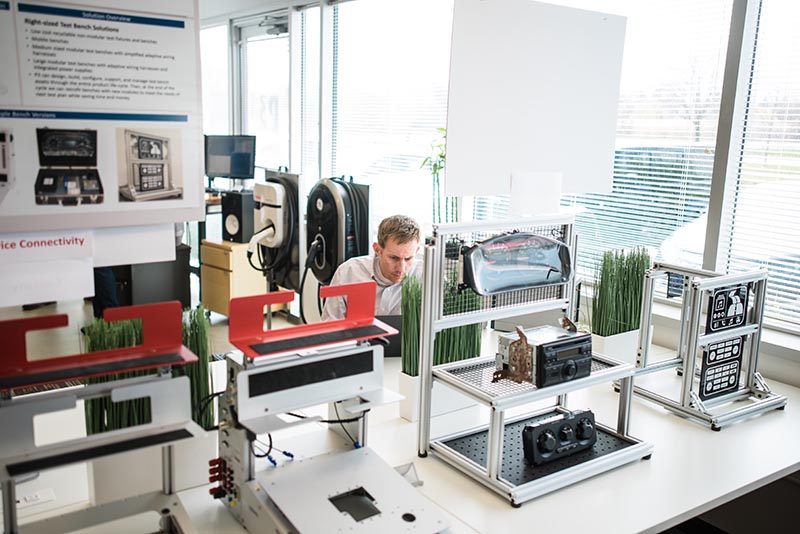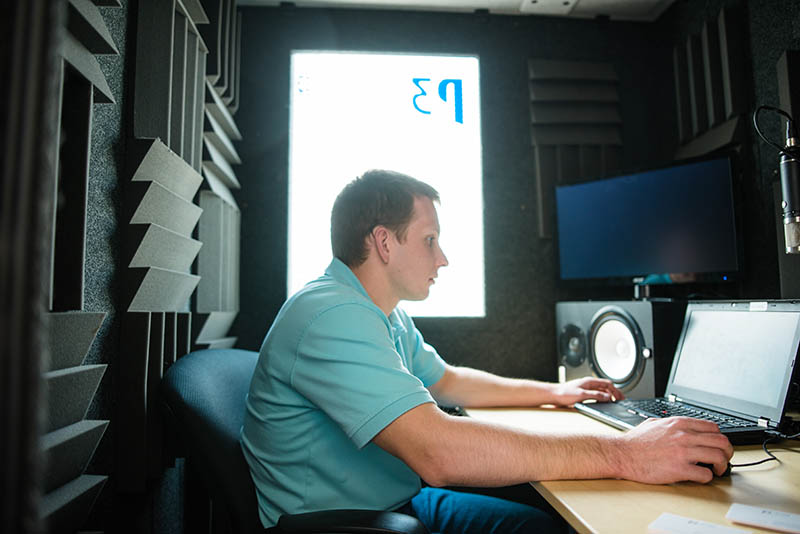In the driverless car race, California companies have eye on Michigan

Several years ago, Praveen Singh made a bet on Detroit.
The Silicon Valley technology startup he founded decided to market the advanced wireless systems it developed to the automotive industry. As the market for the technology grew, Singh and his small team at Arada Systems Inc., found themselves spending more time on airplanes, flying from California to Detroit and Washington, D.C., for meetings with automakers and federal transportation administrators.
Those cross-country flights brought Singh to the realization that if he wanted his company to be on the radar — to really compete — it needed to be in Michigan, a state with proximity to major automotive suppliers and, he said, an aggressive approach to connected vehicle development. Not just a satellite office. The whole operation.
So in 2012, the Stanford University graduate and longtime California resident pulled up stakes and moved his firm and his family to Arada’s new headquarters in Troy. Soon, he said, the company was working more closely with automakers, tier-one suppliers, university researchers and the Michigan Department of Transportation.
“It was a pretty bold move,” Singh, 45, told Crain’s/Bridge Magazine. “I felt, at the end of the day, the only way you’re successful is if you’re living and breathing in a certain location.”
In the race to develop connected and autonomous vehicles, Michigan’s automotive industry is frequently pitted against Silicon Valley’s technological prowess — the Detroit 3, say, versus Tesla Motors Inc. or Google. The perception often is that Silicon Valley’s tech entrepreneurs are disrupting the American auto industry, forcing automakers to accelerate R&D of connected and self-driving vehicles to catch up.
More and more, though, companies are looking to Michigan to establish new offices or — as in the case of Arada Systems — move corporate headquarters to be closer to the vehicle industry. State economic development officials, hoping to boost Michigan’s cachet as a leader in the nascent mobility industry, are hoping to capitalize on that interest by recruiting the firms and their talent here.
It’s not just startups. Japanese automaker Toyota Motor Corp. and even Google are setting up research hubs in Southeast Michigan, which some say will only help the state attract more software engineers and developers, the kind of highly skilled professionals that Michigan has been coveting for years.
“I step back sometimes and think it’s great to see new companies come along who are disrupting what we think of as the traditional auto industry. And that’s actually a benefit to the industry,” said Kevin Kerrigan, the state’s senior automotive initiatives adviser and leader of the Michigan Economic Development Corp.’s automotive office.
“There’s a middle ground somewhere between a lot of the new thinking and the way we produce technology here in Michigan,” Kerrigan said. “I think we’re starting to see the car companies here really look at that.”
Competing on mobility
Late last year, MEDC created a dedicated team within its business attraction arm to recruit firms with expertise in connected and automated vehicle technology. The work group’s roughly 20 members represent some Southeast Michigan counties and regional economic development groups, including the Detroit Regional Chamber, The Right Place Inc. in Grand Rapids and Ann Arbor Spark, Kerrigan said.
While not exclusively focused on California, the MEDC’s team is not a stranger to the state. It staffed a booth representing Michigan at the Intelligent Transportation Society of America’s 2016 trade show in June in San Jose, Calif. And Kerrigan said he likely will visit California at least twice more before the end of the year.
Michigan is strategically targeting companies that work on sensor technology, software development or cybersecurity, Kerrigan said. The MEDC is in talks with about a dozen companies in various stages of interest in Michigan. Kerrigan would not disclose the names of the firms, citing nondisclosure agreements, but said some have developed technologies in California and are looking for purchasing opportunities with automakers in Michigan.
The state is throwing its effort behind a new marketing campaign called “Planet M,” which was created to promote all of Michigan’s mobility programs in one place. Kerrigan said the message has been well-received in Silicon Valley.
“Some people describe it as a battle for different areas of technology, but the truth is, we need to work with California and they need to work with us,” he said. “Where it becomes interesting is: At the center of a lot of activity for the state is talent. The global automotive industry is short of talent, and we have a lot of people who are retiring in the next few years. It’s going to become even more of a daily drumbeat.
“We see people being attracted to California. We see people from California coming here.”
Traditional automakers and Silicon Valley’s technology industry are increasingly interdependent, as both look for ways to compete on mobility, said Richard Wallace, director of the transportation systems analysis group with the Center for Automotive Research in Ann Arbor. Automakers, while still reliant on building cars, are expanding research into new technologies. And tech developers are searching for new applications for their products.
“Even if I’ve got systems integration and sensors and intelligence that allow for automation and I’m coming out of the West Coast, I still have to figure out the whole rest of the vehicle,” Wallace said. “What you’re actually starting to see is a little bit of cross-flow.”
In March, Ford Motor Co. created a subsidiary called Ford Smart Mobility LLC, with dual operations in Palo Alto, Calif., and Dearborn. General Motors Co. acquired San Francisco-based Cruise Automation, which develops automated vehicle technology. Fiat Chrysler Automobiles NV and Alphabet Inc.’s Google are teaming up on a driverless minivan project.
And Toyota in June opened its newest automated vehicle research facility in Ann Arbor, the third such center within Toyota’s $1 billion Toyota Research Institute project. Other locations are in Cambridge, Mass., and Palo Alto. The Ann Arbor site is not far from Toyota’s technical centers and the University of Michigan.
The Massachusetts location focuses on simulation, while the California office has employees who are knowledgeable about user interface and artificial intelligence technology, said Edwin Olson, co-director of autonomous driving for Toyota’s institute and an associate professor of electrical engineering and computer science at UM. Yet much of the autonomous vehicle research will happen in Ann Arbor, he added, aided by the 32-acre Mcity testing site at UM.
“We are really, in part, Toyota’s answer to: How does a traditional OEM adapt to the new technology industry that exists and how do you interact, compete or join the Silicon Valley type of environment?” he said. “I think we’ve got our foot firmly in Ann Arbor and Boston and Palo Alto, and we kind of get the best of all worlds.”
Olson said Toyota’s institute has had no trouble recruiting talent; many employees came from Toyota’s existing technical centers, he said. Still others came from tech firms on the West and East coasts.
Strategic advantage
In April, P3 North America Inc. opened what it’s calling its Mobility Innovation Center on 11 Mile Road in Southfield.
The German global consulting and technology firm opened its first North American office in Detroit in 2005 to support a consortium of automakers — including GM, what was then DaimlerChrysler and BMW — on a joint hybrid vehicle project, said Samit Ghosh, president and CEO of P3 North America Inc. and a Crain’s 40 Under 40 honoree in 2010.
The Mobility Innovation Center was created when P3 recognized a need to expand and moved its automotive office from Troy, Ghosh said. P3 wanted to stay in Southeast Michigan. The 25,000-square-foot center includes an onsite workshop, prototype equipment, private space for auto clients to test technology, a mobile device library and a sound booth to develop voice recognition software, Ghosh said.
P3 works with clients in the automotive, aerospace and telecommunications industries. It offers clients help with early-stage product development through launch. It employs about 3,400 globally, with 500 in North America. About 140 are based in the Southfield office, with about 60 of 100 planned new hires in the Midwest this year expected to be based here.
Ghosh said P3 no longer breaks out revenue figures for its North American location. In 2010, Ghosh told Crain’s the revenue was projected to top $6 million that year and double over the next five years.
He said his company bucks the perception that connected and automated vehicle technology can only be developed in Silicon Valley.
“I’m not a big fan of ‘Silicon Valley versus Detroit.’ I feel it has to go hand-in-hand,” Ghosh said. “There’s a strategic advantage to be in Michigan, to understand those future technologies and work on them, but be close to the automakers.”
Some of the technology firms might wind up as traditional auto suppliers, Wallace said. Yet he said he also believes a shift toward mobility could change the entire auto supply chain, particularly tier-one suppliers, because their vehicle systems will need to be compatible with technology systems that they may or may not have developed.
Arada Systems was founded as a spinoff of Qualcomm Atheros Inc., owned by San Diego-based wireless technology developer Qualcomm Inc. In November, it was bought for an undisclosed price by Southfield-based auto supplier Lear Corp., and exists now as a wholly owned subsidiary.
Singh is now Lear’s vice president of connectivity.
Arada Systems also contracts with the Michigan Department of Transportation to provide roadside sensors that help public infrastructure communicate with connected vehicles during testing.
The company employs 80 around the world, with about 15 in Michigan. Singh would not disclose revenue figures, though he said Arada Systems did “several million dollars” in business annually. Today, it sells infrastructure products to Michigan and numerous other states, software and modules to automakers and aftermarket parts.
Singh said that Silicon Valley today is the right place to be innovative as a company because of the availability of talent, but Michigan can compete when it comes to its workforce.
What Michigan really needs to succeed in creating, he said, is a culture change in the C-suite.
“What we do is we put a heavy emphasis on culture, on making sure that failure (is OK) — and that’s something that California companies do a lot better,” Singh said. “Once that mindset comes into play, then this place is as good as any place.”
See what new members are saying about why they donated to Bridge Michigan:
- “In order for this information to be accurate and unbiased it must be underwritten by its readers, not by special interests.” - Larry S.
- “Not many other media sources report on the topics Bridge does.” - Susan B.
- “Your journalism is outstanding and rare these days.” - Mark S.
If you want to ensure the future of nonpartisan, nonprofit Michigan journalism, please become a member today. You, too, will be asked why you donated and maybe we'll feature your quote next time!
 P3 North America, Inc. EV consultant Andrew McIndoo getting ready to demo P3’s EV charging interoperability testing capabilities. (Photo courtesy of P3 North America Inc.)
P3 North America, Inc. EV consultant Andrew McIndoo getting ready to demo P3’s EV charging interoperability testing capabilities. (Photo courtesy of P3 North America Inc.) P3 technician Cole Scott works in the sound booth for voice recognition, recording and sound analysis testing. (Photo courtesy of P3 North America Inc.)
P3 technician Cole Scott works in the sound booth for voice recognition, recording and sound analysis testing. (Photo courtesy of P3 North America Inc.) P3’s workshop in Michigan is a 10-car full vehicle workshop with prototyping capabilities. The company’s Mobility Innovation Center, which opened in April in Southfield, also includes labs to study connectivity, autonomous vehicles, eMobility, cybersecurity and other in-vehicle telematics and mobility solutions. (Photo courtesy of P3 North America Inc.)
P3’s workshop in Michigan is a 10-car full vehicle workshop with prototyping capabilities. The company’s Mobility Innovation Center, which opened in April in Southfield, also includes labs to study connectivity, autonomous vehicles, eMobility, cybersecurity and other in-vehicle telematics and mobility solutions. (Photo courtesy of P3 North America Inc.) Samit Ghosh, president and CEO of P3 North America Inc., said he doesn’t like the mindset that Silicon Valley is in battle against Detroit for connected and automated vehicle technology. “I feel it has to go hand-in-hand,” Ghosh said of merging the strengths of the two areas. (Photo courtesy of P3 North America Inc.)
Samit Ghosh, president and CEO of P3 North America Inc., said he doesn’t like the mindset that Silicon Valley is in battle against Detroit for connected and automated vehicle technology. “I feel it has to go hand-in-hand,” Ghosh said of merging the strengths of the two areas. (Photo courtesy of P3 North America Inc.)